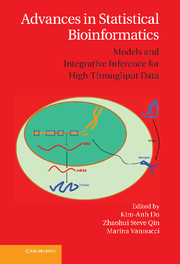Book contents
- Frontmatter
- Contents
- List of Contributors
- Preface
- 1 An Introduction to Next-Generation Biological Platforms
- 2 An Introduction to The Cancer Genome Atlas
- 3 DNA Variant Calling in Targeted Sequencing Data
- 4 Statistical Analysis of Mapped Reads from mRNA-Seq Data
- 5 Model-Based Methods for Transcript Expression-Level Quantification in RNA-Seq
- 6 Bayesian Model-Based Approaches for Solexa Sequencing Data
- 7 Statistical Aspects of ChIP-Seq Analysis
- 8 Bayesian Modeling of ChIP-Seq Data from Transcription Factor to Nucleosome Positioning
- 9 Multivariate Linear Models for GWAS
- 10 Bayesian Model Averaging for Genetic Association Studies
- 11 Whole-Genome Multi-SNP-Phenotype Association Analysis
- 12 Methods for the Analysis of Copy Number Data in Cancer Research
- 13 Bayesian Models for Integrative Genomics
- 14 Bayesian Graphical Models for Integrating Multiplatform Genomics Data
- 15 Genetical Genomics Data: Some Statistical Problems and Solutions
- 16 A Bayesian Framework for Integrating Copy Number and Gene Expression Data
- 17 Application of Bayesian Sparse Factor Analysis Models in Bioinformatics
- 18 Predicting Cancer Subtypes Using Survival-Supervised Latent Dirichlet Allocation Models
- 19 Regularization Techniques for Highly Correlated Gene Expression Data with Unknown Group Structure
- 20 Optimized Cross-Study Analysis of Microarray-Based Predictors
- 21 Functional Enrichment Testing: A Survey of Statistical Methods
- 22 Discover Trend and Progression Underlying High-Dimensional Data
- 23 Bayesian Phylogenetics Adapts to Comprehensive Infectious Disease Sequence Data
- Index
- Plate section
10 - Bayesian Model Averaging for Genetic Association Studies
Published online by Cambridge University Press: 05 June 2013
- Frontmatter
- Contents
- List of Contributors
- Preface
- 1 An Introduction to Next-Generation Biological Platforms
- 2 An Introduction to The Cancer Genome Atlas
- 3 DNA Variant Calling in Targeted Sequencing Data
- 4 Statistical Analysis of Mapped Reads from mRNA-Seq Data
- 5 Model-Based Methods for Transcript Expression-Level Quantification in RNA-Seq
- 6 Bayesian Model-Based Approaches for Solexa Sequencing Data
- 7 Statistical Aspects of ChIP-Seq Analysis
- 8 Bayesian Modeling of ChIP-Seq Data from Transcription Factor to Nucleosome Positioning
- 9 Multivariate Linear Models for GWAS
- 10 Bayesian Model Averaging for Genetic Association Studies
- 11 Whole-Genome Multi-SNP-Phenotype Association Analysis
- 12 Methods for the Analysis of Copy Number Data in Cancer Research
- 13 Bayesian Models for Integrative Genomics
- 14 Bayesian Graphical Models for Integrating Multiplatform Genomics Data
- 15 Genetical Genomics Data: Some Statistical Problems and Solutions
- 16 A Bayesian Framework for Integrating Copy Number and Gene Expression Data
- 17 Application of Bayesian Sparse Factor Analysis Models in Bioinformatics
- 18 Predicting Cancer Subtypes Using Survival-Supervised Latent Dirichlet Allocation Models
- 19 Regularization Techniques for Highly Correlated Gene Expression Data with Unknown Group Structure
- 20 Optimized Cross-Study Analysis of Microarray-Based Predictors
- 21 Functional Enrichment Testing: A Survey of Statistical Methods
- 22 Discover Trend and Progression Underlying High-Dimensional Data
- 23 Bayesian Phylogenetics Adapts to Comprehensive Infectious Disease Sequence Data
- Index
- Plate section
Summary
Genetic Association Studies
Genetic association studies seek to identify genetic variants associated with a particular disease or phenotype. Typically, the phenotype of interest will be a complex trait that is not determined by a single recessive, additive, or dominant allele (Lander and Schork, 1994). Although there has been a shift in recent years toward genome-wide association studies(GWAS) that agnostically test all single-nucleotide polymorphisms (SNPs) for association with a disease, many genetic association studies still focus on candidate genes that have functions known to be related to the phenotype. Although it is scientifically preferable to include as many SNPs as possible, the number of SNPs in a study is often limited by practical constraints such as cost. The statistical methods discussed in this chapter are primarily applicable to studies using several hundred SNPs. For a discussion of Bayesian approaches for full-scale GWAS, which may include up to 1 million SNPs, see Chapters 9 and 11.
A variety of study designs for genetic association studies have been proposed; for a comparison, see Cordell and Clayton (2005). The most common design for binary outcomes is the population-based case-control study. Family-based designs, which examine patterns of inheritance in related individuals, are also useful, particularly when the variant of interest is rare in the overall population. Data for family studies may come from extended pedigrees or from triads of affected offspring and their parents. In the case-parent triad design, disease-associated SNPs are identified using the transmission disequilibrium test (TDT), which is based on the idea that affected children will have nonrandom inheritance of causal genetic variants from their parents.
Information
- Type
- Chapter
- Information
- Advances in Statistical BioinformaticsModels and Integrative Inference for High-Throughput Data, pp. 208 - 223Publisher: Cambridge University PressPrint publication year: 2013
Accessibility standard: Unknown
Why this information is here
This section outlines the accessibility features of this content - including support for screen readers, full keyboard navigation and high-contrast display options. This may not be relevant for you.Accessibility Information
- 1
- Cited by
